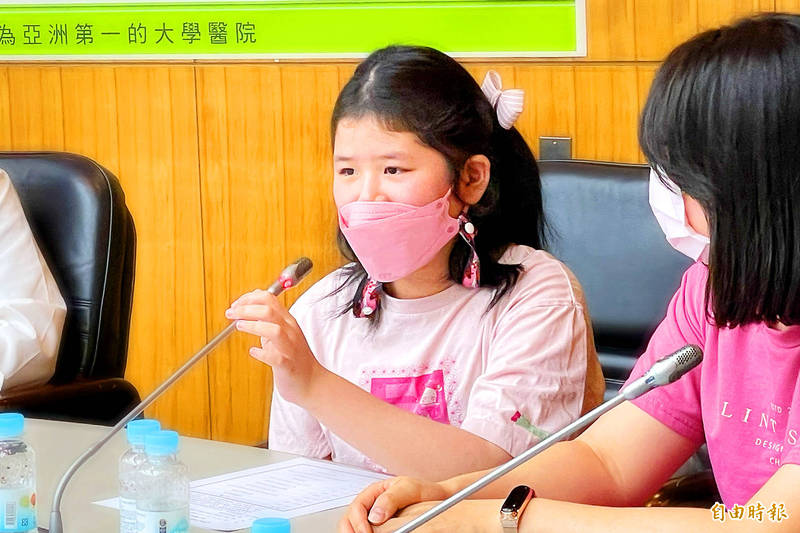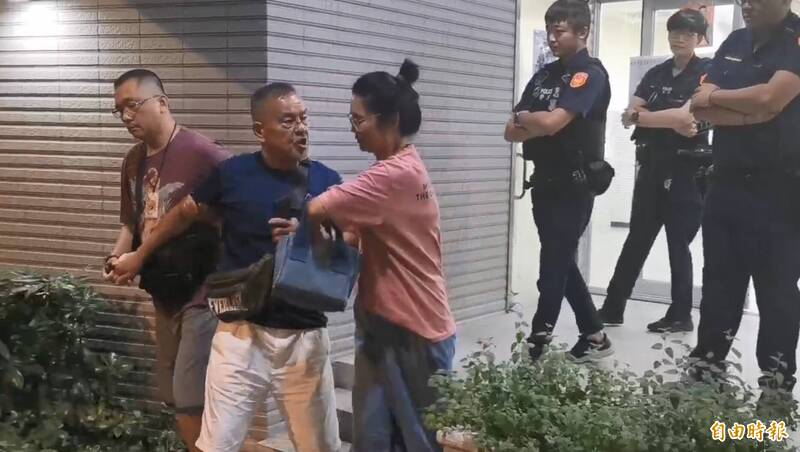《TAIPEI TIMES》 Leukemia treatment sets a Taiwan first

10-year-old girl Ting-ting (亭亭), who has been battling leukemia for more than four years , becomes the first person in Taiwan to be successfully treated with a new form of immunotherapy. Photo: Chiu Chih-jou, Taipei Times
CHILD PATIENT: Doctors said that an infusion of CD19 CAR T-cells put a 10-year-old girl’s cancer into complete remission, allowing her to celebrate her birthday at home
/ Staff writer, with CNA
A 10-year-old girl who has been battling leukemia for more than four years has become the first person in Taiwan to be successfully treated with a new form of immunotherapy, doctors at National Taiwan University Hospital (NTUH) said yesterday.
The child, identified only as Ting-ting (亭亭), was diagnosed with pediatric B-cell acute lymphoblastic leukemia at the age of six and was initially receiving targeted chemotherapy, her doctors told a news conference.
When her leukemia recurred last year, doctors recommended the CD19 chimeric antigen receptor (CAR) T-cell therapy — a immunotherapy treatment that was introduced in the past decade and had never previously been used successfully to treat a person with leukemia in Taiwan.
After an infusion of CD19 CAR T-cells in April, Ting-ting’s cancer went into complete remission, the doctors said, adding that she was recently able to spend her 10th birthday at home with her family.
CAR T therapies became prominent in 2012, when they were successfully used in a clinical trial to treat Emily Whitehead, a six-year-old American girl who had been diagnosed with leukemia.
In such therapies, immune cells called T-cells are taken from a patient’s blood and modified by adding a gene for a CAR, which helps them attach to the specific cancer cell antigen. They are then put back in the patient.
Ting-ting’s mother recalled the difficulty she had in explaining the cancer diagnosis to such a young child, telling the news conference that she eventually told her daughter it was “like having a cold” and would get better if she took her medicine.
She thanked her daughter’s medical team for discussing with her the option of CAR T-cell therapy, which she said allowed them to begin the treatment as soon as Ting-ting’s cancer recurred.
Cancer is the second-leading cause of death among children in Taiwan and leukemia accounts for a significant proportion, said Lee Wang-tso (李旺祚), director of NTUH’s Department of Pediatrics.
In the past, the options for treating pediatric leukemia have been limited mainly to chemotherapy, which can cause adverse reactions, and bone marrow transplants, which are difficult to arrange and sometimes require the patient to take immunosuppressant drugs indefinitely, Lee said.
Jou Shiann-tang (周獻堂), a doctor in the hospital’s Department of Hematology and Oncology, said that about 500 new pediatric leukemia cases are diagnosed in Taiwan each year.
About one-quarter of them are acute lymphoblastic leukemia and about 15 percent of such patients have adverse reactions to treatment or the cancer recurs, Jou said.
Ting-ting’s parents said that the CD19 CAR T-cell therapy has the potential to help other children.
However, the treatment is not covered by the National Health Insurance, which meant that they had to sell their home to pay the NT$10 million (US$334,571) it cost.
The National Health Insurance Administration is reviewing whether to cover such treatments in the future, the hospital said.
新聞來源:TAIPEI TIMES













